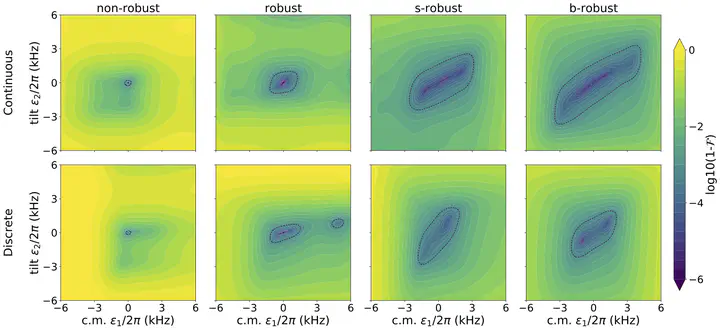Batch Optimization of Frequency-Modulated Pulses for Robust Two-Qubit Gates in Ion Chains
Mingyu Kang, Qiyao (Catherine) Liang, Bichen Zhang, Shilin Huang, Ye Wang, Chao Fang, Jungsang Kim, Kenneth R. Brown
August, 2021
Abstract
Two-qubit gates in trapped-ion quantum computers are generated by applying spin-dependent forces that temporarily entangle the internal state of the ion with its motion. Laser pulses are carefully designed to generate a maximally entangling gate between the ions while minimizing any residual entanglement between the motion and the ion. The quality of the gates suffers when the actual experimental parameters differ from the ideal case. Here, we improve the robustness of frequency-modulated Mølmer-Sørensen gates to motional mode-frequency offsets by optimizing the average performance over a range of systematic errors using batch optimization. We then compare this method with frequency-modulated gates optimized for ideal parameters that include an analytic robustness condition. Numerical simulations show good performance up to 12 ions, and the method is experimentally demonstrated on a two-ion chain.
Publication
Physical Review Applied 16, 024039

PhD student at MIT EECS
I’m a third-year PhD student in the Electrical Engineering and Computer Science department at MIT. My primary interest is in the intersection of physics, AI, and neuroscience. I’m advised by Ila Fiete from the MIT Brain and Cognitive Science department. Some of my recent interests are understanding the mechanisms of compositional generalization in generative models, how structural and/or functional modularity emerge within artificial and biological systems, and beyond. I’m interested in a broad range of topics regarding studying the principles of artificial/biological intelligence and consciousness as emergent phenomena, via quantitative tools from physics as well as empirical studies. I completed my undergraduate studies at Duke University in physics and math, where I worked on controlling and denoising quantum computers.
 Robust Landscape
Robust Landscape